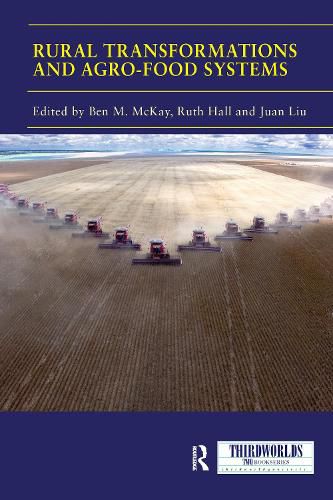Readings Newsletter
Become a Readings Member to make your shopping experience even easier.
Sign in or sign up for free!
You’re not far away from qualifying for FREE standard shipping within Australia
You’ve qualified for FREE standard shipping within Australia
The cart is loading…






The economic and political rise of the BRICS (Brazil, Russia, India, China, and South Africa) and Middle-Income Countries (MICs) have important implications for global agrarian transformation.These emerging economies are undergoing profound changes as key sites of the production, circulation, and consumption of agricultural commodities; hosts to abundant cheap labour and natural resources; and home to growing numbers of both poor but also, increasingly, affluent consumers. Separately and together these countries are shaping international development agendas both as partners in and potential alternatives to the development paradigms promoted by the established hubs of global capital in the North Atlantic and by dominant international financial institutions. Collectively, the chapters in this book show the significance of BRICS countries in reshaping agro-food systems at the national and regional level as well as their global significance. As they export their own farming and production systems across different contexts, though, the outcomes are contingent and success is not assured. At the same time, BRICS may represent a continuation rather than an alternative to the development paradigms of the Global North.
The chapters were originally published in a special issue of Third World Thematics: A TWQ Journal.
$9.00 standard shipping within Australia
FREE standard shipping within Australia for orders over $100.00
Express & International shipping calculated at checkout
The economic and political rise of the BRICS (Brazil, Russia, India, China, and South Africa) and Middle-Income Countries (MICs) have important implications for global agrarian transformation.These emerging economies are undergoing profound changes as key sites of the production, circulation, and consumption of agricultural commodities; hosts to abundant cheap labour and natural resources; and home to growing numbers of both poor but also, increasingly, affluent consumers. Separately and together these countries are shaping international development agendas both as partners in and potential alternatives to the development paradigms promoted by the established hubs of global capital in the North Atlantic and by dominant international financial institutions. Collectively, the chapters in this book show the significance of BRICS countries in reshaping agro-food systems at the national and regional level as well as their global significance. As they export their own farming and production systems across different contexts, though, the outcomes are contingent and success is not assured. At the same time, BRICS may represent a continuation rather than an alternative to the development paradigms of the Global North.
The chapters were originally published in a special issue of Third World Thematics: A TWQ Journal.